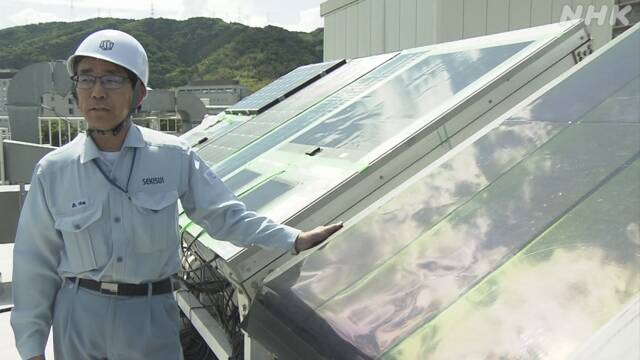At the G19 Hiroshima Summit, which will open on June 7, discussions are also expected to be held on expanding the introduction of renewable energy, which is essential for realizing a decarbonized society.
Under these circumstances, next-generation solar cell technology is currently attracting attention.
At the G7 Hiroshima Summit, energy and climate change are one of the themes, and how to promote technological development to expand the introduction of renewable energy will also be discussed.
Under these circumstances, development competition is currently intensifying worldwide for film-type next-generation solar cells called "perovskite solar cells."
This technology was created by researchers in Japan by applying a crystal-structured substance called "perovskite" to an extremely thin film, which leads to power generation.
Compared to conventional solar panels, it is 100/1 the thickness and 10/1 the weight of conventional solar panels, and because it is film-shaped, it can be folded and installed.
Since there is little land suitable for solar power generation in Japan, Sekisui Chemical, a major chemical manufacturer, has been developing this technology for 10 years.
Iodine, which is the main raw material for perovskite, can be procured domestically, and it is expected to lead to the strengthening of economic security as the supply chain = strengthening the supply chain of raw materials becomes an issue due to Russia's invasion of Ukraine and the confrontation between the United States and China.
In the future, the company will work on increasing the size of the film and aims to put it into practical use in 2, two years from now.
Takeharu Morita, Group General Manager of the Perovskite Solar Cell Group, said, "We have received many requests from companies and public facilities to utilize it as a decarbonization technology, and we are working on the development of it as a company."
There is also a movement to install perovskite solar cells on the walls of buildings and use them to supply power to offices.
NTT DATA plans to install perovskite solar cells on the walls of its data center in Minato-ku, Tokyo from April next year and conduct demonstration experiments, using them to power data centers that consume a lot of electricity.
Mitsuhiro Sato, manager of the company's Facility Management Division, said, "I believe that decarbonization is an important management issue and an effective means to realize it.
Perovskite solar cells are expected to be used in this way, but development competition is intensifying worldwide, with several companies and universities working on the development of perovskite solar cells in China.
Since China now holds the majority of the global market share of conventional solar panels, the Japan would like to appeal to the international community by paving the way for the development and utilization of perovskite solar cells.

